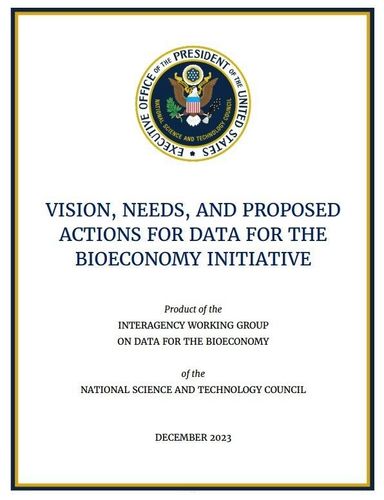DOE: Interagency group releases new report to strengthen a data-driven US bioeconomy

SOURCE: U.S. Department of Energy
January 9, 2024
BY U.S. Department of Energy
The Biden-Harris Administration announced the release of Vision, Needs, and Proposed Actions for Data for the Bioeconomy Initiative, a report on advancing biotechnology; improving U.S. data infrastructure and accessibility; and sustainably growing the bioeconomy across the nation's climate, energy, biomanufacturing, health, agricultural, and environment sectors.
Coordinated across 13 federal agencies by the Interagency Working Group on Data for the Bioeconomy, the report lays the groundwork for Section 4(a) of President Biden’s Executive Order on Advancing Biotechnology and Biomanufacturing Innovation for a Sustainable, Safe, and Secure American Bioeconomy, as part of the National Biotechnology and Biomanufacturing Initiative (NBBI). The NBBI aligns with the U.S. Department of Energy Bioenergy Technologies Office’s (BETO) priorities to advance biotechnology and biomanufacturing by developing a strong foundation for the necessary data and computational capacity of our growing bioeconomy.
Advertisement
The report outlines the current landscape of data and infrastructure supporting U.S. biotechnology and biomanufacturing and identifies the current obstacles to and proposed actions for accelerating the bioeconomy. The Data for the Bioeconomy Initiative, for which this report services, will ensure biotechnology developers and researchers have streamlined access to high-quality, secure, and wide-ranging biological data sets that can provide insight into solutions to critical global issues. The Initiative includes the following Core Actions as initial priorities:
- Dedicated long-term funding for data and computational resources and infrastructure- Design and support a trusted, sustainable data ecosystem that connects data and computational resources and seamlessly integrates them to enable and accelerate bioeconomy outcomes.
- Standards- Develop and adopt consensus standards to establish best practices that foster and strengthen a shared U.S. bioeconomy data ecosystem of integrated resources that spans agencies, the research enterprise, and other key stakeholders to streamline and sustain collaboration.
- Biodata Catalog- Provide a new persistent resource that identifies existing data and metadata and adds new data and metadata coupled with unique persistent identifiers (PIDs).
- Security- Adapt practices and develop policies that secure the data landscape while supporting innovation pathways.
- Workforce- Include new federal hiring mechanisms and education, training, and engagement efforts to broaden and expand participation in data science and related STEM fields and to drive U.S. leadership in the bioeconomy of the future.
- Strategically Targeted Areas for Rapid Transformation (STARTs)- Consider focused investments in key areas of need to determine viability and impact and chart a course for larger investments.
- Coordination of intergovernmental investments, efforts, and resources- Leverage the National Science and Technology Council frameworks for cross-government collaboration and agency support to create an advisory committee of external experts.
A thriving U.S. bioeconomy requires strategic investments and coordination of resources to ensure the data and computational infrastructure has continued support, the data are accessible, and the infrastructure is flexible enough to respond to rapidly evolving data sources and applications. Investment in and coordination of this data infrastructure are critical to meeting the Executive Order’s Bold Goals for U.S. Biotechnology and Biomanufacturing .
Advertisement
The Vision, Needs, and Proposed Actions for the Data for the Bioeconomy Initiative report outlines a whole-of-government approach to streamlining access to high quality data and maintaining a robust data infrastructure that will empower a flourishing U.S. bioeconomy.
Related Stories
The U.S. EPA on July 8 hosted virtual public hearing to gather input on the agency’s recently released proposed rule to set 2026 and 2027 RFS RVOs. Members of the biofuel industry were among those to offer testimony during the event.
The USDA’s Risk Management Agency is implementing multiple changes to the Camelina pilot insurance program for the 2026 and succeeding crop years. The changes will expand coverage options and provide greater flexibility for producers.
EcoCeres Inc. has signed a multi-year agreement to supply British Airways with sustainable aviation fuel (SAF). The fuel will be produced from 100% waste-based biomass feedstock, such as used cooking oil (UCO).
President Trump on July 4 signed the “One Big Beautiful Bill Act.” The legislation extends and updates the 45Z credit and revives a tax credit benefiting small biodiesel producers but repeals several other bioenergy-related tax incentives.
CARB on June 27 announced amendments to the state’s LCFS regulations will take effect beginning on July 1. The amended regulations were approved by the agency in November 2024, but implementation was delayed due to regulatory clarity issues.
Upcoming Events










